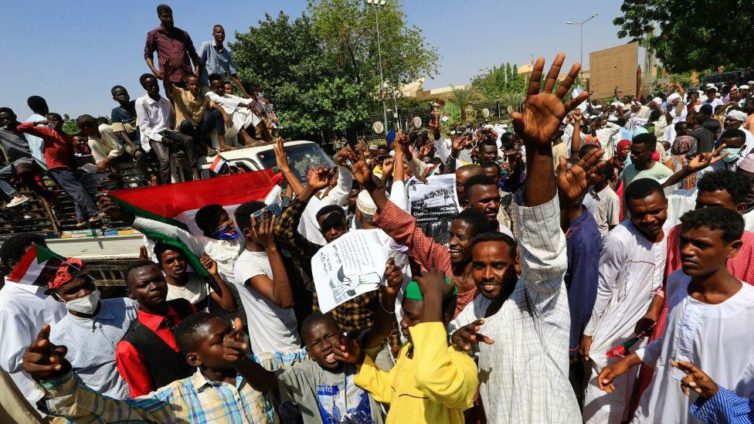Opponents of Sudan's transition to democracy took to the streets of Khartoum on Saturday to call on the army to take control of the country.
Several thousand demonstrators gathered outside the presidential palace as the country's political crisis deepens.
Military and civilian groups have been sharing power since the toppling of President Omar al-Bashir in 2019.
However, tensions have grown since a coup attempt attributed to followers of Mr. Bashir was foiled in September.
Since then, military leaders have been demanding reforms to the Forces of Freedom and Change (FFC) coalition, a civilian alliance that led the anti-Bashir protests and formed a key part of the transitional government. The armed forces have also called for the replacement of the cabinet.
However, civilian leaders say that the demands are part of a power grab from the armed forces.
On Saturday, pro-military demonstrators chanted "down with the hunger government" and called for General Abdel Fattah al-Burhan, head of the armed forces and Sudan's joint military-civilian Sovereign Council, to instigate a coup and seize control of the country.
"We need a military government, the current government has failed to bring us justice and equality," one protester told AFP.
Unlike previous demonstrations in the country, protesters were allowed to reach the gates of the presidential palace and there was little police presence.
Pro-government protesters have also called a rally on Thursday in response to Saturday's demonstrations.
On Friday, Sudan's civilian Prime Minister, Abdallah Hamdok, unveiled a plan to tackle what he called the country's "worst and most dangerous" political crisis in its two-year transition.
"I am not neutral or a mediator in this conflict. My clear and firm position is complete alignment to the civilian democratic transition," he said.
Mr Hamdok was sworn in as Prime Minister in August 2019, after mass protests saw the military step in and end the 30-year-rule of Omar al-Bashir in April.
But support for the transitional government has slumped in recent months as economic reforms spearheaded by Mr Hamdok have seen fuel subsidies slashed and inflation soar.
Latest Stories
-
The Internet doesn’t forget: When Bawumia predicted Gold Purchasing Programme was a ‘Game Changer’ to Ghana’s macroeconomic management
3 minutes -
‘I am a singer, Patapaa isn’t but he’s great’ – Yaw Darling clarifies, apologises to musician
17 minutes -
Isaac Botsio clocks 9.94s to win NCAA DII
53 minutes -
Expert urges calm over mosquito disease found in UK
1 hour -
Russia intensifies strikes across Ukraine
1 hour -
Godfred Dame, Thaddeus Sory, and the Anatomy of a Legal Heartbreak
2 hours -
Real 24 Hours crowned champions of inaugural Betway Tumu Community Cup
3 hours -
Trump, Malema, Ramaphosa and the Oval Office grill
4 hours -
Godfred Dame ‘replies’ Thaddeus Sory over ‘personal attacks’
4 hours -
‘We did not sign up for this’: Harvard’s foreign students are stuck and scared
5 hours -
A record number of Americans applied for UK citizenship as Trump began his second term
5 hours -
Denmark raises retirement age to 70 — the highest in Europe
6 hours -
Dr. China rejects Kwabena Agyapong’s top-down election proposal for NPP
6 hours -
These companies will raise prices because of Trump’s tariffs
6 hours -
UNTWO election: PABF urges Africa to back UAE’s Al Nowais bid to be first Secretary-General
7 hours

